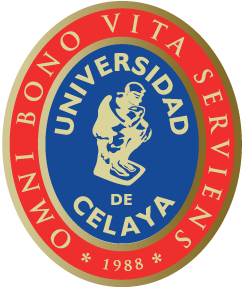Principles of Communication.
Introduction.
Communication at the University of Celaya is fundamental for institutional development and allows us to build agreements for the achievement of the Mission and Vision. In that sense, we consider the following principles aligned to our philosophy, identifying two contexts: internal communication (within the institution) and external communication (outside the institution). The fundamental purposes of institutional communication are the following:
- To make known and spread to the community and abroad the most important things in terms of academic and co-curricular life.
- Disseminate research and extension according to our institutional profile and that contributes to society.
- Building community. Build agreements where all parties participate in the solutions in a responsible way.
Some internal institutional means: Interpersonal communication (dialogue), e-mail, showcases in each area, UniApp and SODAL wall newspaper.
Some external media: social networks, publications or editions in traditional and electronic media.
Some principles of communication that govern us:
- We communicate and prioritize student achievement.
- Communicate the achievements of the institution, because in the end that creates the reputation of the university, its alma mater.
- Communicate the academic activity of each area.
- Communicate the co-curricular activity of each area. Social projects, significant activities outside of academia but that support the educational model.
- It avoids communicating aspects of the personal lives of members of the whole community.
- Dialogue is favoured (rumour is avoided) in order to favour assertive communication and to reach agreements, to concrete academic and co-curricular projects that support the formative process.
- We generally do not make pronouncements or manifest ourselves in ideological positions on the media agenda (as they are often distracting). We have a perfectly defined social agenda and work on projects on a permanent basis. Among which we highlight: (This is how we contribute to our country). Gender equality (STEM girls, women entrepreneurs) business vision).
Of communication with students:
- To listen to the students, you have the following moments along their journey:
a) Interpersonal communication with the principal, tutor or student life leader.
(b) Focus group.
(c) Mid-career survey.
(d) Teacher evaluations.
(e) Exit survey.
2. Students have freedom of expression, as long as they keep the consideration and respect for the institution, their classmates, academic and administrative staff, parents, employers and society in general; always avoiding any form of attack on the morals, privacy and rights of the people referred to and third parties; also avoid causing any crime and / or disturbing public order.
- This freedom of expression shall be exercised solely and exclusively in the spaces, forms and times explicitly permitted for this purpose:
- Spaces: SODAL wall newspaper.
- Forms: respect, truthfulness, objectivity and with the responsibility of the comments expressed through the specific legend.
- Timing: the period of publication will be determined by the communication committee.
The above, upon request and authorization by the communication area of the University of Celaya based on the Principles of Communication of that institution. Any communication authorized must be made exclusively by the person proposing it and in no case shall it represent the institutional position or that of the community, which must be expressly stated in such communication. The following legend must appear in such expressions: The expression contained in this communication is the authorship and exclusive responsibility of ... and in no way represents the institutional position of the system of the University of Celaya, nor that of its community.
- Any communication that is expressed must be substantiated with respect, truthfulness, objectivity and with responsibility for the comments that are expressed.
- In case of any anomalous or urgent situation, the student must use the institutional channels (interpersonal communication, e-mail) and make it known to the people indicated to follow up (area director, direction of Student Life, Psychopedagogical, tutors, etc.) according to the protocols of privacy in the handling of information (students or collaborators). In the case of an anonymous complaint, it is difficult to follow up.
- The students will be able to make publications when they conform as a student group to the Uni Culture chapter provided in the regulations.
- As a fundamental principle, linguistic and political proselytism is prohibited, in order to respect different ways of thinking.
- In the case of the expressions made by students in social networks, they will be in an absolutely personal capacity without being able to represent the institutional position or that of its members, nor represent a grievance to the institution and/or its community. Consequently, any damage, affectation or crime that they cause will be the exclusive responsibility of the person who expresses it and must assume the institutional and/or legal consequences that such expressions give rise to.
- We promote leadership in your fingerprint. Be aware of:
Everything that is published on social networks leaves a "trace" of their image as a person, of their education, of how they handle their emotions and of their values.
This trace cannot be erased, it remains permanently in cyberspace (even if it is erased).
Social networks are uncontrollable, chaotic and infinitely powerful as a means of communication.
That is why care must be taken with what is published, what is answered, what is shared or discussed, as this shows a distorted image of a person and even of his or her social circle.
A digital leader, it focuses on publishing positive content, which promotes values, social actions, innovative proposals and above all responsible.
- Failure to comply with the principles of institutional communication are considered extra-academic breaches of integrity under the terms of the General Regulations for Students and will be treated as such.

Phone: +52 (461) 6139099
informes@udec.edu.mx
Location: Carretera Panamericana km. 269 Col. Rancho Pinto, Celaya, Guanajuato, Mexico C.P. 38080

